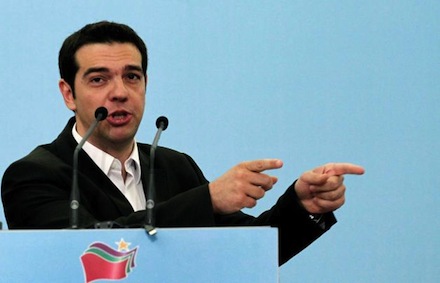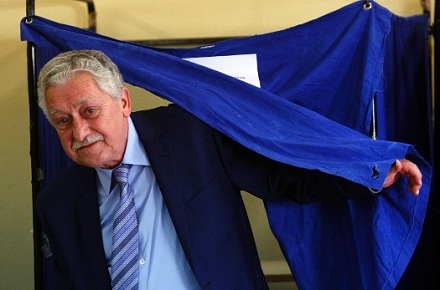There aren’t many silver linings in being forced to hold two legislative elections in as many months, while your country is running out of money, mired in near-depression economic conditions and suffering from budget cuts that have torn apart the country’s social contract.![]()
But perhaps one of the best things that can come of the June 17 elections — regardless of whether the pro-bailout center-right New Democracy or the anti-bailout radical left SYRIZA wins — is the chance that the neo-fascist Golden Dawn party will fare significantly poorer this time around.
Among other things, reduced support for Golden Dawn would significantly facilitate the arithmetic of forming a government.
The high-profile implosion of the party’s spokesperson Ilias Kasidiaris — an arrest warrant was issued for Kasidiaris after he threw water at one female parliamentary candidate yesterday and repeated slapped another on a live television talk show — does not bode well for the party’s chances:
The exchanges came when the discussion turned to the sensitive topic of the Greek Civil War (1946-1949).When Kasidiaris called [Communist MP Liana] Kanelli an “old Commie”, she retorted that he was a “fascist”. Kasidiaris also was incensed that SYRIZA’s Rena Dourou mentioned a pending court case against him.When Dourou said that there was a “crisis of democracy when people who will take the country back 500 years have got into the parliament”, Kasidiaris, who has served in the army’s special forces, picked up a glass of water and hurled its contents at her.“You joke,” he shouted.He then turned on Kanelli, who had got up out of her chair and appeared to throw a newspaper at him.He slapped Kanelli three times on the side of the face.
The Kasidiaris distraction follows a ridiculous post-election press conference in May when Nikolaos Mihaloliakos, the party’s leader, launched into a neo-nazi screed after the party’s thugs tried to force journalists to stand at attention.
Golden Dawn thrives on these confrontational moments to attract attention. But even if you think that these kinds of outbursts are deliberate, it’s a sign of Golden Dawn’s weakness that it is staging these moments to suck away media attention from the main parties just 10 days before the election.
In the May elections, Golden Dawn won 6.97% of the vote and 21 seats. Parties will win seats in the parliament, on the basis of proportional representation, if they can draw more than 3% of the vote. Continue reading Golden Dawn incident highlights possibility of neo-fascist decline in Greek election re-run





